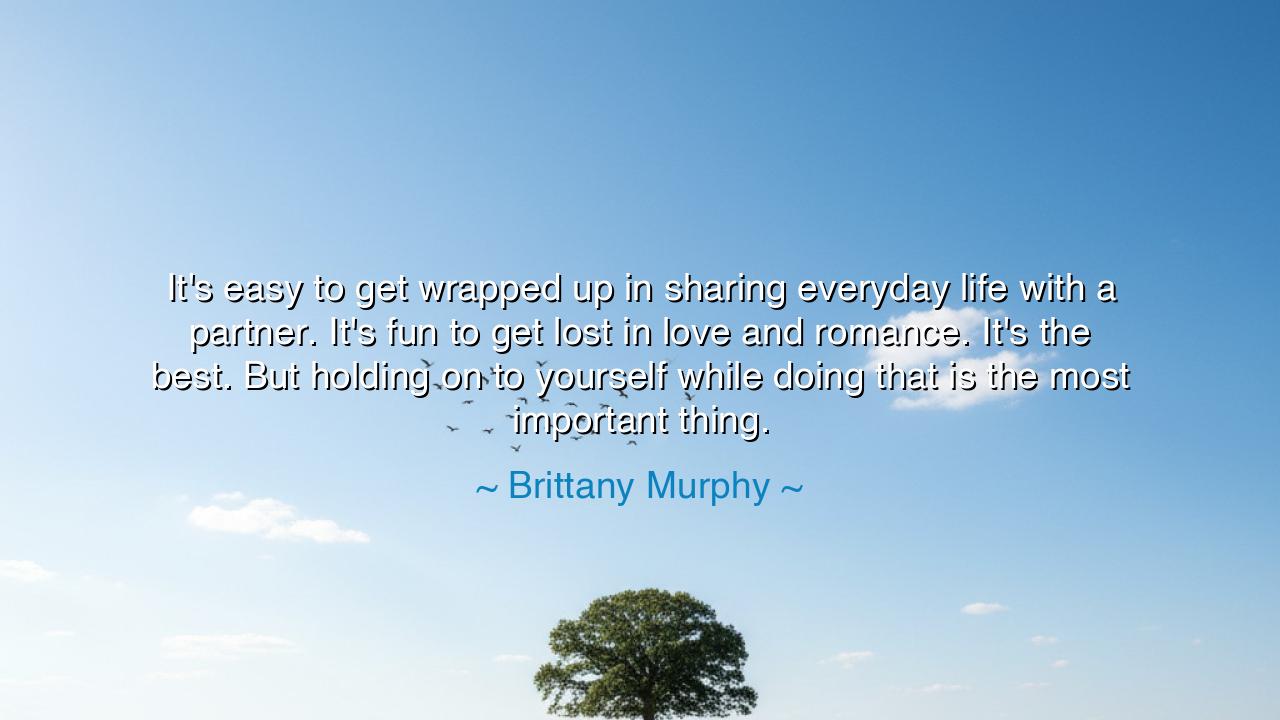
It's easy to get wrapped up in sharing everyday life with a
It's easy to get wrapped up in sharing everyday life with a partner. It's fun to get lost in love and romance. It's the best. But holding on to yourself while doing that is the most important thing.






The words of Brittany Murphy shine with both joy and caution, like a flame that warms but also warns: “It’s easy to get wrapped up in sharing everyday life with a partner. It’s fun to get lost in love and romance. It’s the best. But holding on to yourself while doing that is the most important thing.” Here she speaks of the double nature of love—that it is both a sanctuary and a tempest, both a source of delight and a danger if the self is forgotten within it.
The ancients would have recognized this wisdom. They sang of lovers who lost themselves entirely, sometimes to glory, sometimes to ruin. To “get lost” in romance is a sweetness beyond compare, for it carries the heart into rapture, dissolving the loneliness of existence. Yet, Murphy reminds us that the soul must not vanish in this ecstasy. For when one forgets the self, love ceases to be a union of two beings and becomes instead a consuming fire that leaves no one whole.
Consider the legend of Cleopatra and Mark Antony. Their love was fiery and intoxicating, binding them so tightly that they forsook empires, duties, and reason itself. Though their passion has been immortalized, their downfall was as great as their devotion. They became lost in one another and, in so doing, lost themselves. Their tale is a living testament to Murphy’s warning: romance may be “the best,” but without the anchor of self, even the grandest love can lead to ruin.
Yet, Murphy’s words are not a rejection of passion—they are a call to balance. She acknowledges the beauty of sharing everyday life with a partner, of laughter, of joy, of the simple intimacy that makes existence rich. These are treasures to be cherished, not denied. But she urges us to remember that alongside these treasures, we must preserve our own inner flame—our identity, our purpose, our individuality. For if we lose these, even the brightest love cannot keep us whole.
There is profound wisdom here: true love does not demand the death of the self but its flourishing. A partner who truly loves you does not ask you to disappear but to shine more fully. To hold on to yourself is not selfishness, but the deepest form of devotion—for it allows you to bring your whole being to the one you love. The strength of two lies not in fusion into one shadow, but in two lights burning brightly side by side, illuminating one another.
The lesson is clear: embrace romance, delight in it, lose yourself in its joy for moments—but always return to your center. Cultivate your passions, your friendships, your inner voice. Do not lay aside your identity for the sake of harmony, for harmony is false if it comes at the cost of self. A relationship is strongest when it is built not on neediness but on the strength of two whole souls who choose, again and again, to walk together.
Therefore, let all who hear take action: Love deeply, but remember who you are. Laugh and dream with your beloved, but also dream for yourself. Guard your individuality as you would guard a precious jewel, for it is the gift you bring to the union. And when love is balanced with selfhood, it becomes not a consuming fire, but a steady light—one that guides you, sustains you, and endures beyond the fleeting tides of passion.
Thus, Brittany Murphy leaves us with a teaching both tender and eternal: romance is a joy beyond words, but the truest love is not the loss of self—it is the union of two selves, strong, whole, and free.






AAdministratorAdministrator
Welcome, honored guests. Please leave a comment, we will respond soon